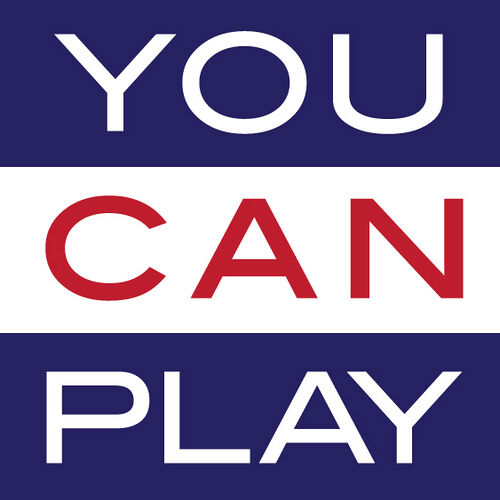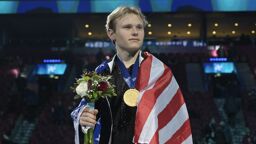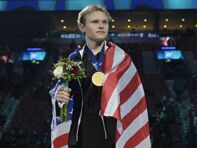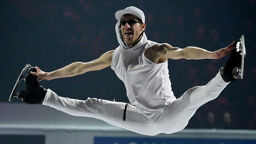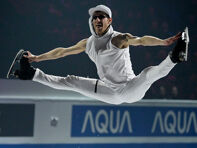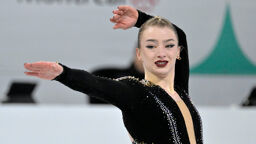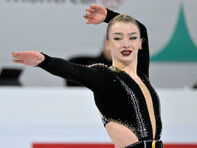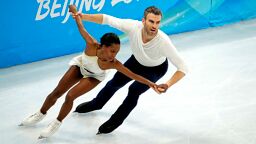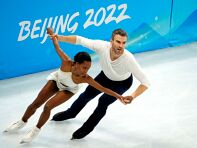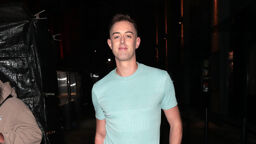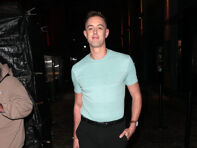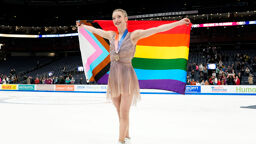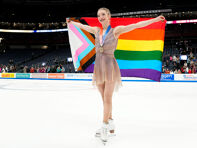 Must Reads
Must Reads 
Eric Radford can already hear it coming.
The Olympic figure skater in the prime of his career knows the stereotypes associated with men in his sport. He's heard it since he was a child when a classmate asked him why his parents forced him to figure skate.
"They don't force me," he told her. "I like it."
That precipitated years of torment by other kids his age in rural Ontario. Not only was he performing in what his peers considered the "gayest" sport of all, he also had a lisp that plagued his childhood.
"Oh, a gay figure skater," Radford can hear ringing in his ears as people around the world read this story, "big shocker."
We heard the same things when Sheryl Swoopes came out of the closet in the WNBA almost a decade ago. Yet the surprise then and now isn't that there is a lesbian in basketball or a gay man in figure skating; The surprise is that they are willing to come out in a sports world that has still not fully reconciled its issues with LGBT athletes.
Fact: No elite figure skater on the world stage has ever come out publicly at the height of his competitive career.
None.
Ever.
Only one – Rudy Galindo in 1996 – did it while still competing at all, retiring from competition after that season.
Sure, Johnny Weir put on a Hello Kitty shirt and Gucci sunglasses and bobbed his head to Christina Aguilera. But not even Weir ever said "I'm gay" publicly until after he had retired from competition (not including his ill-fated "comeback").
It's a scary path to walk for a figure skater. Unlike a sprinter, they are not timed. Unlike a football player, they don't have stats like catches and sacks. A figure skater's success depends on the subjective scores of judges. Those judges are certainly given guidelines. They walk through rigorous instruction on how to judge, and they have deep connections to the sport – An elite international judge won't give a "5" to a "9" performance. But a point here and there? It very well may have cost Weir a medal in 2010.
That hasn't held back Radford's rise to the world stage. Plenty of people in the closed circles of figure skating know about his sexual orientation. Despite that, he and skating partner Meagan Duhamel have found incredible success. They were part of the Canadian team that won silver at the Sochi Olympic Games in February. They won bronze in pairs skating at the World Championships in both 2013 and 2014 and are the three-time defending Canadian champions. They earned gold at last week's Grand Prix event in Osaka, Japan, which will send them to the Grand Prix final in Barcelona next week. It was their second win of the year.
"The judges' job is to mark our skating," Radford told Outsports through his jetlag this week, hours after a long trip from the Grand Prix in Osaka, Japan. "Any sort of bias they could have, they are taught how to judge and how to be as unbiased as possible. It doesn't always happen. But I'm not afraid."
Radford has thought about coming out publicly before. Earlier this year, just weeks before the Sochi Winter Olympics, he contacted GLAAD for advice on coming out. The folks there told him it would be an incredible opportunity to send a powerful message of strength from the LGBT community. They were right, and Radford gave it careful consideration. He understood what would happen if he came out just before the Games – He would become a media darling, the proverbial "poster child" for LGBT rights at the Olympics in Russia, where anti-LGBT laws and sentiment were a hot-button issue.
"My concern was that I would be known as 'the gay athlete' if I came out at the Olympics, rather than Eric the medalling figure skater who happens to be gay. And I felt uncomfortable with that title."
Radford was also quite conscious of the warnings about being gay in Russia. Reports ranged from mild concern to outright red-alert heading into the Olympic Games. The Canadian Olympic Committee warned athletes and coaches that the Russian government could possibly be looking at a host of issues – including laptop computers – in regards to an athlete's sexual orientation.
Unsure of the climate in Sochi and wanting, like so many athletes before him, to be judged on his athleticism and not his sexuality, Radford chose to wait. While the skating community knew whom he was, the public would just have to wait.
Truth be told, his personal life was already a bit of an open book. While his Facebook page jokingly lists him as a director at NASA and graduate of Harvard's medical school (yes you read that right), most of his social media presence is a reflection of his true self. On Aug. 26 he posted this response to the Ice Bucket Challenge, featuring his boyfriend of four years, Normand:
At the Olympics in February a Canadian reporter asked him who was in Sochi to support him. It was an opportunity to subtly dip a big toe out of the closet in a very public way.
"Oh my family, some friends," he responded, "and my boyfriend."
The reporter opted to not include that last piece in her report.
Radford wasn't always this free with his sexuality. When he was younger, a "tween" by today's definitions, he was teased mercilessly by other boys for his lisp and mannerisms that screamed "gay." The other kids used it against him, pounding him verbally with gay epithets.
Before eighth grade he was sent to live with a host family and train for figure skating. Before that school year, Radford forced himself to ditch the lisp and any "gay" mannerisms he might have carried. It was a new school, all new students, and an opportunity to define himself as something other than a "gay figure skater."
"I didn't want to be different. I wanted to be like all the other boys."
Each year he landed at a new school for his training: in Winnipeg at 14, Montreal at 15 and Toronto at 16. While the skating community was his constant, he was never able to latch onto a group of friends at school, jettisoning them every summer as he headed elsewhere.
His coach at the time was Paul Wirtz, a gay man who didn't hide his sexual orientation, often inviting his partner to practice skates and competitions. Radford composed the Olympic short-program music for himself and Duhamel and dedicated the song to Wirtz, who passed away in 2006.
"Paul was the first gay person I ever saw in real life. The gay people on TV were always very flamboyant, and until I met Paul I didn't realize you could be gay and just be normal. He was the first person I saw who was like that, gay and just normal. He made me realize I didn't have to be afraid of it."
Years later, after he failed to make the 2010 Olympic team with his former skating partner, Radford came to a crossroads. His beloved coach and mentor long gone, he knew the competitive future with his then-partner was not bright, and he couldn't return to singles competition and make it to the Olympics. He was on the precipice of quitting the sport and going to school when he connected with Duhamel, whom he had known since childhood. The two hit it off quickly and set their sites on the Sochi Olympics.
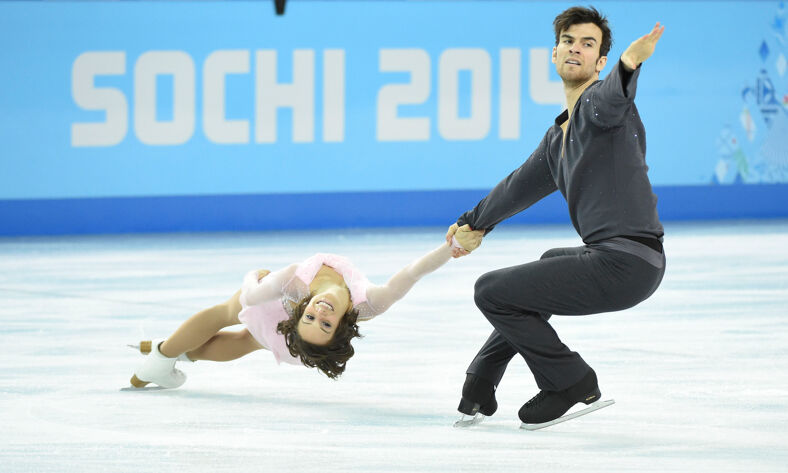
Feb 11, 2014; Sochi, RUSSIA; Meagan Duhamel and Eric Radford of Canada during the pairs short program of the Sochi 2014 Olympic Winter Games at Iceberg Skating Palace. Photo credit: Robert Deutsch-USA TODAY Sports
The new duo had their struggles, which only stiffened Radford's resolve. At the 2011 ISU World Figure Skating Championships, Duhamel came down from a toss elbows-first and broke Radford's nose on the first element of their short program. For all of the people pooh-poohing the fortitude and strength of these incredible athletes, you need only watch the video below to witness Radford pushing through an elegant and intense program with blood pouring from his nose. Despite his broken nose, they finished seventh overall that year.
While Radford dates men, he has never given a second thought to skating with a woman. That's been the norm since he entered the sport and he's never questioned it. While other skating pairs, almost all straight, envelop their routines with themes of love and romance, that has never been the story of this pair – and it never will be.
"The romance doesn't come through," Radford said of their partnership, "but the strong connection does."
Radford thinks his sexual orientation actually gives him an advantage over many of the straight skaters, who Radford believes make up all of the other top 10 pairs in the world.
"A lot of pairs end up dating one another. It can become risky because your on-ice training can be affected by your off-ice relationship. If you have a fight at home, it makes that training difficult. I used to joke around that I'm the ultimate pair-boy. I never had to worry about developing an off-ice relationship."
Far more important to him than the gender of his partner, he and Duhamel reached their four-year goal: a spot in the 2014 Winter Olympics. The Sochi Games earlier this year exceeded Radford's expectations, which had been soured by the negative press leading up to the Games.
"It was actually amazing. All of the facilities and living arrangements were clean and new. The arena was beautiful. All of the volunteers were extremely nice. I was anticipating more of a typical stoic, serious Russian welcome. I had a presumption about how Russian people were. It changed my perception of them."
Still, Radford kept his secret away from the media, away from the Russians, away from the public at home. While his boyfriend, Normand, accompanied him to Sochi, Radford remembers pausing before parting from Normand in public, considering a kiss or hug and ultimately opting against either. A simple "good-bye" or "see you later" would have to suffice. There was no need to invite the specter of trouble in Russia.
Radford and Canadian figure skating brought home a team silver medal. Duhamel and Radford finished seventh overall in the pairs competition.
When he returned home to Montreal, Radford found his family life waiting. He's been with Normand for about four years. With Normand came a daughter, now a teenager, at the same age Radford was once sent off by his family to pursue a nomadic existence in search of athletic glory. Radford is experiencing a domestic life through the eyes of Normand's daughter like he never got to experience when he was her age.
"I'm proud of our whole situation, how we're basically a gay family. We function great, we get along so well. We have become a family. I was only 25 when I met Normand. I don't know many gay guys that age who would take on that responsibility. But I jumped right in. It's been fun and fulfilling and has broadened my perspective on so many things."
Radford and Duhamel leave Monday for Barcelona and the Grand Prix Final. At the height of their careers, they are already targeting the 2018 Olympics in South Korea. In April, Radford had the Olympic rings tattooed below his chest, a symbol of his commitment to the goal. While individual skaters' competitive careers usually end before they are 30, pairs skaters can succeed on the international stage until they near 40. At 29, Radford sees 2018 as his grand finale.
Between now and then, he hopes to inspire LGBT youth to follow their athletic dreams. Growing up he had no gay role models to look up to other than stereotypical portrayals on television. If he inspires one young man struggling with bullies and doubters, it will have been worth it to step out of the closet in this very public way. He'll be working with the Canadian Olympic Committee on their #OneTeam initiative, developed to reach one million youth in the next year by sending Olympians into schools to talk about LGBT issues.
"I put up with a lot of crap. Not just bullying but people who just thought I couldn't make it, people in skating who don't like how Meagan and I skate, people who say we don't deserve the marks we get. I've had to overcome a lot.
"But if you believe in yourself and focus on your dream and you work hard and surround yourself with a good team who will support you, you can achieve anything you want."
You can follow Eric Radford on Twitter @Rad85E. Radford can be reach through Paulo Senra of the Canadian Olympic Committee on Twitter or via email at [email protected].
